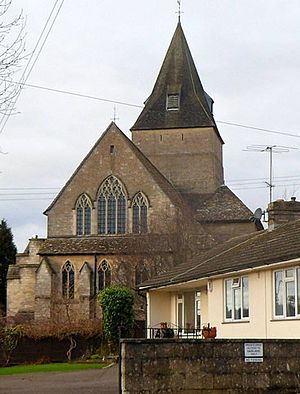Church of All Saints, Stroud facts for kids
Quick facts for kids Church of All Saints |
|
|---|---|
 |
|
| 51°44′59″N 2°12′35″W / 51.7497°N 2.2096°W | |
| Location | Uplands, Stroud, Gloucestershire, GL5 1TU |
| Country | England |
| Denomination | Church of England |
| History | |
| Status | Active |
| Dedication | All Saints |
| Dedicated | May 1910 |
| Architecture | |
| Functional status | Parish church |
| Architect(s) | Temple Moore |
| Architectural type | Gothic Revival |
| Administration | |
| Parish | Slad |
| Deanery | Archdeaconry of Gloucester |
| Diocese | Diocese of Gloucester |
The Church of All Saints is a beautiful and historic Church of England parish church located in the Uplands area of Stroud, Gloucestershire. It serves as a local church for the community. This special building is recognized as a Grade I listed building, which means it's very important and protected. It was designed by a famous architect named Temple Moore in a style called Gothic Revival. After Temple Moore passed away, another architect, Leslie Moore, finished building it.
Contents
All Saints Church: A Special Place
The Church of All Saints is more than just a building; it's a central part of the Uplands community. As a parish church, it's where local people gather for worship, special events, and community activities. It's a place that has been important to many families for generations.
What is a Parish Church?
A parish church is like a local church for a specific area, called a "parish." It's where people from that neighborhood can go for religious services, baptisms, weddings, and funerals. It often acts as a community hub, offering support and a place for people to connect.
The Architects Behind the Church
The original design for the Church of All Saints came from a well-known architect named Temple Moore. He was famous for designing many churches and other buildings in the late 1800s and early 1900s. Sadly, Temple Moore passed away before the church was fully completed. His work was then continued and finished by Leslie Moore. This means the church is a blend of their architectural visions.
Gothic Revival Style
The Church of All Saints was built in the Gothic Revival style. This architectural style became popular in the 18th and 19th centuries. It brought back many features from the original Gothic architecture of the Middle Ages.
- Pointed Arches: You'll often see tall, pointed arches in windows and doorways.
- Stained Glass: Churches in this style often have beautiful, colorful stained glass windows that tell stories.
- Steep Roofs and Towers: They usually have high, steep roofs and sometimes tall towers or spires that reach towards the sky.
- Detailed Stone Work: Look closely, and you might see intricate carvings and decorative stone work.
This style was chosen to create buildings that felt grand and inspiring, much like the great cathedrals of medieval times.
What is a Grade I Listed Building?
Being a Grade I listed building is a very high honor for a structure in England. It means the building is considered to be of "exceptional interest." This is the highest grade of protection for historic buildings.
- Protection: It means the building is protected by law. You can't make big changes to it without special permission.
- History: These buildings are important parts of history. They tell us about how people lived and built things in the past.
- Rarity: Only about 2.5% of all listed buildings in England are Grade I. This shows how special the Church of All Saints truly is.
This protection helps make sure that future generations can also enjoy and learn from these amazing historical places.
 | Lonnie Johnson |
 | Granville Woods |
 | Lewis Howard Latimer |
 | James West |

